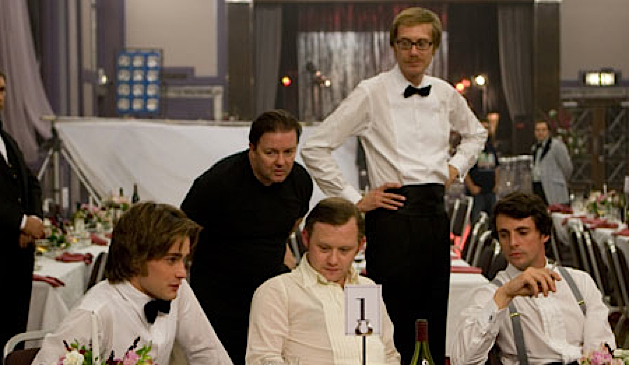Why you can trust GamesRadar+
Fade up on a sun-glazed rural panorama – England aglow before the blissed-out swell of Vaughan Williams… Cut to a languid montage of small-town splendour (shallow valley, woozy village green, chugging double-decker)… Then, from bucolic idyll to the graft and grime of daily life, as Tom Hughes’ cocky upstart Bruce clocks off his factory job to meet booze buddies Snork (Jack Doolan, snaggled, loveable) and Freddie (Christian Cooke, dashing but conflicted).
It would be an assured intro for an experienced director, but as the story progresses, big-screen neophytes Ricky Gervais and Stephen Merchant are confirmed as born filmmakers with a flair for pacing, detail, mood and character. The pair have always juxtaposed tears and laughter. The Office was a midlife crisis in spotlight. Extras picked away at the cult of celebrity. Cemetery Junction is hardly Michael Haneke, but it’s much less of an out-and-out comedy than you might expect. It’s an energetic and enduring drama that chews on big themes (ambition, ageing, family breakdown) with a perfect blend of sweet and sharp.
Freddie wants to move on and grow up – ideally, with Julie (Felicity Jones), the smart and talented daughter of his snake-eyed insurance-firm boss Mr Kendrick (Ralph Fiennes). Snork, coveting the girl in the greasy-spoon, is tired of playing the fool. Bruce’s single father drinks away his pain while his son vents through brawling and copper-baiting. It’s the subtlety of tone that delights: cautionary not sneering; poignant not grim. There is comedy, but it comes in flecks not daubs, and it’s the flashes of humanity that linger – like the father-son moment that plays as a masterstroke of restraint.
The thrust is an Office retread (nice guy loves girl next door who’s engaged to the wrong bloke) and, while the characters convince, the dialogue can feel a little written. But the film never relies on weary Brit-flick clichés, balancing affection for the era, place and people with a timeless endorsement for self-improvement. Get mad. But don’t look back in anger.



